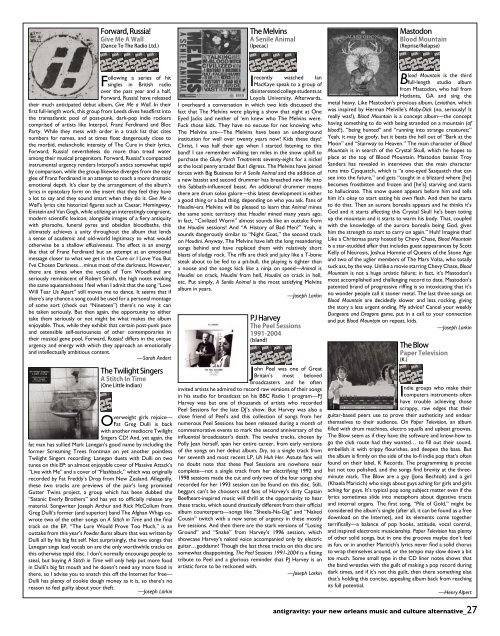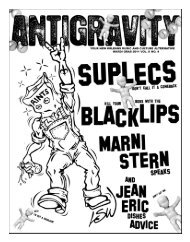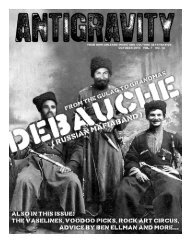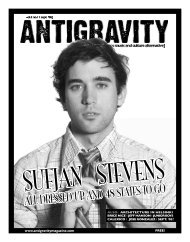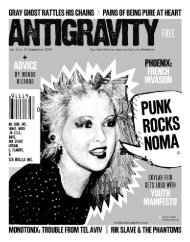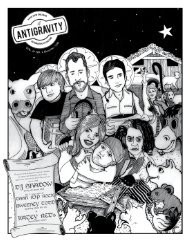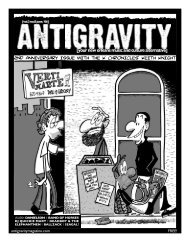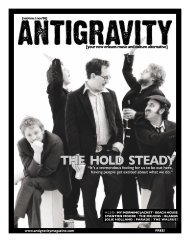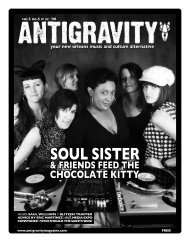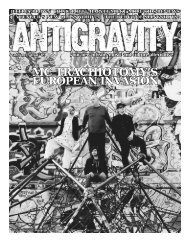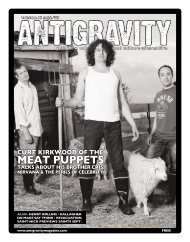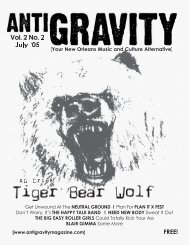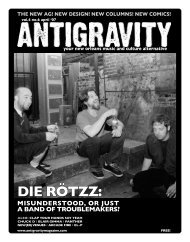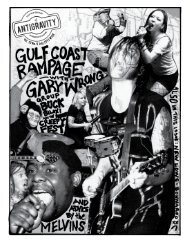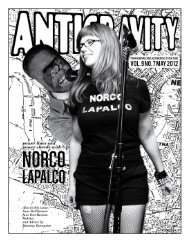January 2007 (PDF) - Antigravity Magazine
January 2007 (PDF) - Antigravity Magazine
January 2007 (PDF) - Antigravity Magazine
- No tags were found...
You also want an ePaper? Increase the reach of your titles
YUMPU automatically turns print PDFs into web optimized ePapers that Google loves.
Following a series of hitsingles in British radioover the past year and a half,Forward, Russia! have releasedtheir much anticipated debut album, Give Me a Wall. In theirfirst full-length work, this group from Leeds dives headfirst intothe transatlantic pool of post-punk, dark-pop indie rockerscomprised of artists like Interpol, Franz Ferdinand and BlocParty. While they mess with order in a track list that citesnumbers for names, and at times float dangerously close tothe morbid, melancholic intensity of The Cure in their lyrics,Forward, Russia! nevertheless do more than tread wateramong their musical progenitors. Forward, Russia!’s compactedinstrumental urgency renders Interpol’s antics somewhat tepidby comparison, while the group likewise diverges from the easyglee of Franz Ferdinand in an attempt to reach a more dramaticemotional depth. It’s clear by the arrangement of the album’slyrics in epistolary form on the insert that they feel they havea lot to say and they sound smart when they do it. Give Me aWall’s lyrics cite historical figures such as Caesar, Hemingway,Einstein and Van Gogh, while utilizing an interestingly congruent,modern scientific lexicon; alongside images of a fiery antiquitywith pharaohs, funeral pyres and obsidian bloodbaths, thisultimately achieves a unity throughout the album that lendsa sense of academic and old-world legitimacy to what wouldotherwise be a shallow effusiveness. The effect is an energylike that of Franz Ferdinand but an attempt at an emotionalmessage closer to what we get in the Cure or I Love You ButI’ve Chosen Darkness…minus most of the darkness. However,there are times when the vocals of Tom Woodhead areseriously reminiscent of Robert Smith, the high notes evokingthe same squeamishness I feel when I admit that the song “LoveWill Tear Us Apart” still moves me to dance. It seems that ifthere’s any chance a song could be used for a personal montageof some sort (check out “Nineteen”) there’s no way it canbe taken seriously. But then again, the opportunity to eithertake them seriously or not might be what makes the albumenjoyable. Thus, while they exhibit that certain post-punk paceand ostensible self-seriousness of other contemporaries intheir musical gene pool, Forward, Russia! differs in the uniqueurgency and energy with which they approach an emotionallyand intellectually ambitious content.—Sarah AndertOverweight girls rejoice—Fat Greg Dulli is backwith another mediocre TwilightSingers CD! And, yet again, thefat man has sullied Mark Lanegan’s good name by including theformer Screaming Trees frontman on yet another pointlessTwilight Singers recording; Lanegan duets with Dulli on twotunes on this EP: an almost enjoyable cover of Massive Attack’s“Live with Me” and a cover of “Flashback,” which was originallyrecorded by Fat Freddy’s Drop from New Zealand. Allegedly,these two tracks are previews of the pair’s long promisedGutter Twins project, a group which has been dubbed the“Satanic Everly Brothers” and has yet to officially release anymaterial. Songwriter Joseph Arthur and Rick McCollum fromGreg Dulli’s former (and superior) band The Afghan Whigs cowrotetwo of the other songs on A Stitch in Time and the finaltrack on the EP, “The Lure Would Prove Too Much,” is anouttake from this year’s Powder Burns album that was written byDulli all by his big fat self. Not surprisingly, the two songs thatLanegan sings lead vocals on are the only worthwhile tracks onthis otherwise tepid disc. I don’t normally encourage people tosteal, but buying A Stitch in Time will only help put more foodin Dulli’s big fat mouth and he doesn’t need any more food inthere, so I advise you to snatch this off the Internet for free—Dulli has plenty of cookie dough money as it is, so there’s noreason to feel guilty about your theft.—Joseph LarkinIrecently watched IanMacKaye speak to a group ofdisinterested college students atLoyola University. Afterwards,I overheard a conversation in which two kids discussed thefact that The Melvins were playing a show that night at OneEyed Jacks and neither of ‘em knew who The Melvins were.Fuck those kids. They have no excuse for not knowing whoThe Melvins are—The Melvins have been an undergroundinstitution for well over twenty years now! Kids these days!Christ, I was half their age when I started listening to thisband! I can remember walking ten miles in the snow uphill topurchase the Gluey Porch Treatments seventy-eight for a nickelat the local penny arcade! But I digress. The Melvins have joinedforces with Big Business for A Senile Animal and the addition ofa new bassist and second drummer has breathed new life intothis Sabbath-influenced beast. An additional drummer meansthere are drum solos galore—this latest development is eithera good thing or a bad thing, depending on who you ask. Fans ofHoudini-era Melvins will be pleased to learn that Animal minesthe same sonic territory that Houdini mined many years ago;in fact, “Civilized Worm” almost sounds like an outtake fromthe Houdini sessions! And “A History of Bad Men?” Yeah, itsounds dangerously similar to “Night Goat,” the second trackon Houdini. Anyway, The Melvins have left the long meanderingsongs behind and have replaced them with relatively shortblasts of sludgy rock. The riffs are thick and juicy like a T-bonesteak about to be fed to a pit-bull, the playing is tighter thana noose and the songs kick like a ninja on speed—Animal isHoudini on crack, Houdini from hell, Houdini on crack in hell,etc. Put simply, A Senile Animal is the most satisfying Melvinsalbum in years.—Joseph LarkinJohn Peel was one of GreatBritain’s most belovedbroadcasters and he ofteninvited artists he admired to record raw versions of their songsin his studio for broadcast on his BBC Radio 1 program—PJHarvey was but one of thousands of artists who recordedPeel Sessions for the late DJ’s show. But Harvey was also aclose friend of Peel’s and this collection of songs from hernumerous Peel Sessions has been released during a month ofcommemorative events to mark the second anniversary of theinfluential broadcaster’s death. The twelve tracks, chosen byPolly Jean herself, span her entire career, from early versionsof the songs on her debut album, Dry, to a single track fromher seventh and most recent LP, Uh Huh Her. Astute fans willno doubt note that these Peel Sessions are nowhere nearcomplete—not a single track from her electrifying 1992 and1998 sessions made the cut and only two of the four songs sherecorded for her 1993 session can be found on this disc. Still,beggars can’t be choosers and fans of Harvey’s dirty CaptainBeefheart-inspired music will thrill at the opportunity to hearthese tracks, which sound drastically different from their officialalbum counterparts—songs like “Sheela-Na-Gig” and “NakedCousin” twitch with a new sense of urgency in these mostlylive sessions. And then there are the stark versions of “LosingGround” and “Snake” from Harvey’s 1996 session, whichshowcase Harvey’s naked voice accompanied only by electricguitar…goddamn! Though the last three tracks on this disc aresomewhat disappointing, The Peel Sessions 1991-2004 is a fittingtribute to Peel and a glorious reminder that PJ Harvey is anartistic force to be reckoned with.—Joseph LarkinBlood Mountain is the thirdfull-length studio albumfrom Mastodon, who hail fromHotlanta, GA and sing themetal heavy. Like Mastodon’s previous album, Leviathan, whichwas inspired by Herman Melville’s Moby-Dick (no, seriously! Itreally was!), Blood Mountain is a concept album—the concepthaving something to do with being stranded on a mountain (ofblood!), “being hunted” and “running into strange creatures;”Yeah, it may be goofy, but it beats the hell out of “Bark at theMoon” and “Stairway to Heaven.” The main character of BloodMountain is in search of the Crystal Skull, which he hopes toplace at the top of Blood Mountain. Mastodon bassist TroySanders has revealed in interviews that the main characterruns into Cysquatch, which is “a one-eyed Sasquatch that cansee into the future,” and gets “caught in a blizzard where [he]becomes frostbitten and frozen and [he’s] starving and startsto hallucinate. This snow queen appears before him and tellshim it’s okay to start eating his own flesh. And then he startsto do that. Then an aurora borealis appears and he thinks it’sGod and it starts affecting this Crystal Skull he's been totingup the mountain and it starts to warm his body. That, coupledwith the knowledge of the aurora borealis being God, giveshim the strength to start to carry on again.” Huh! Imagine that!Like a Christmas party hosted by Chevy Chase, Blood Mountainis a star-studded affair that includes guest appearances by ScottKelly of Neurosis, Joshua Homme of Queens of the Stone Ageand two of the uglier members of The Mars Volta, who totallysuck ass, by the way. Unlike a movie starring Chevy Chase, BloodMountain is not a huge artistic failure; in fact, it’s Mastodon’smost accomplished and challenging record to date. Mastodon’spatented brand of progressive riffing is so intoxicating that it’sno wonder people call it stoner metal. The last three songs onBlood Mountain are decidedly slower and less rocking, givingthe story a less urgent ending. My advice? Cancel your weeklyDungeons and Dragons game, put in a call to your connectionand put Blood Mountain on repeat, kids.—Joseph LarkinIndie groups who make theircomputers instruments oftenhave trouble achieving thosescrappy, raw edges that theirguitar-based peers use to prove their autheticity and endearthemselves to their audience. On Paper Television, an albumfilled with drum machines, electro squalls and upbeat grooves,The Blow seem as if they have the software and know-how togo the club route had they wanted… to fill out their sound,embellish it with trippy flourishes, and deepen the bass. Butthe album is firmly on the side of the lo-fi indie pop that’s oftenfound on their label, K Records. The programming is precisebut not too polished, and the songs find brevity at the threeminutemark. The Blow are a guy (Jona Bechtolt) and a girl(Khaela Maricich) who sings about guys aching for girls and girlsaching for guys. It’s typical pop song subject matter even if thelyrics sometimes slide into metaphors about digestive tractsand internal organs. The first song, “Pile of Gold,” might beconsidered the album’s single (after all, it can be found as a freedownload on the Internet), and its elements come togetherterrifically—a balance of pop hooks, attitude, vocal control,and inspired electronic musicianship. Paper Television has plentyof other solid songs, but in one the grooves maybe don’t feelas fun, or in another Maricich’s lyrics never find a solid chorusto wrap themselves around, or the tempo may slow down a bittoo much. Some small type in the CD liner notes shows thatthe band wrestles with the guilt of making a pop record duringdark times, and if it’s not this guilt, then there something elsethat’s holding this concise, appealing album back from reachingits full potential.—Henry Alpertantigravity: your new orleans music and culture alternative_27


